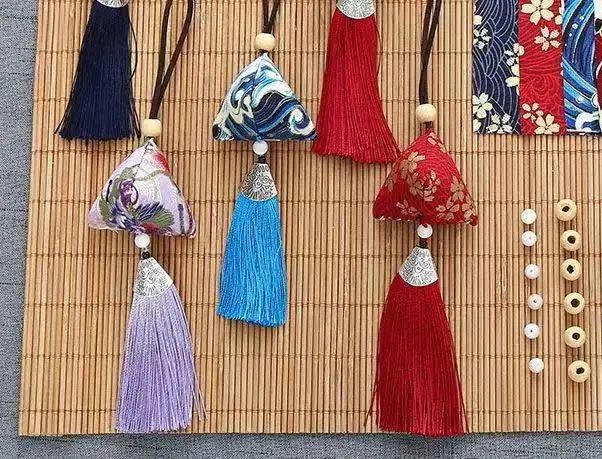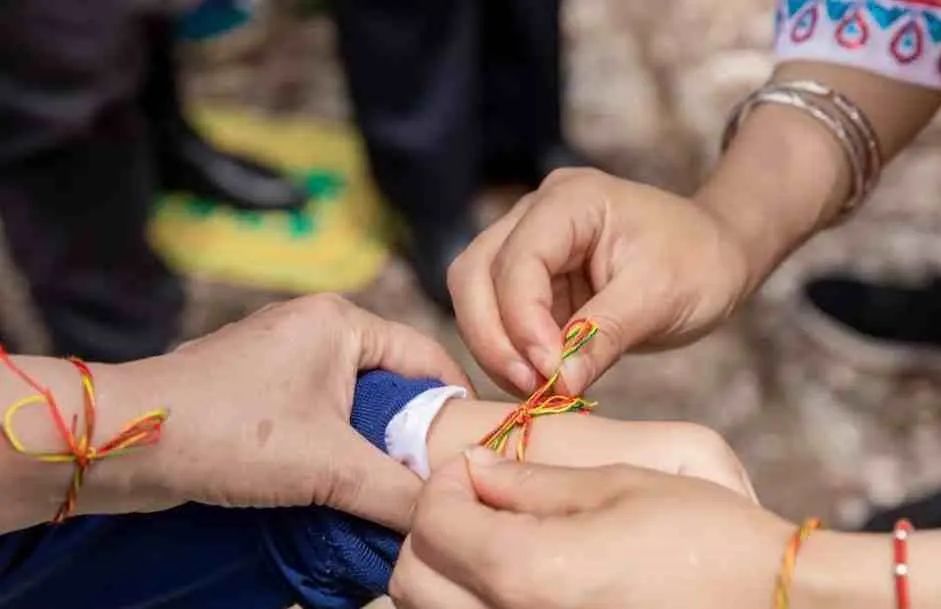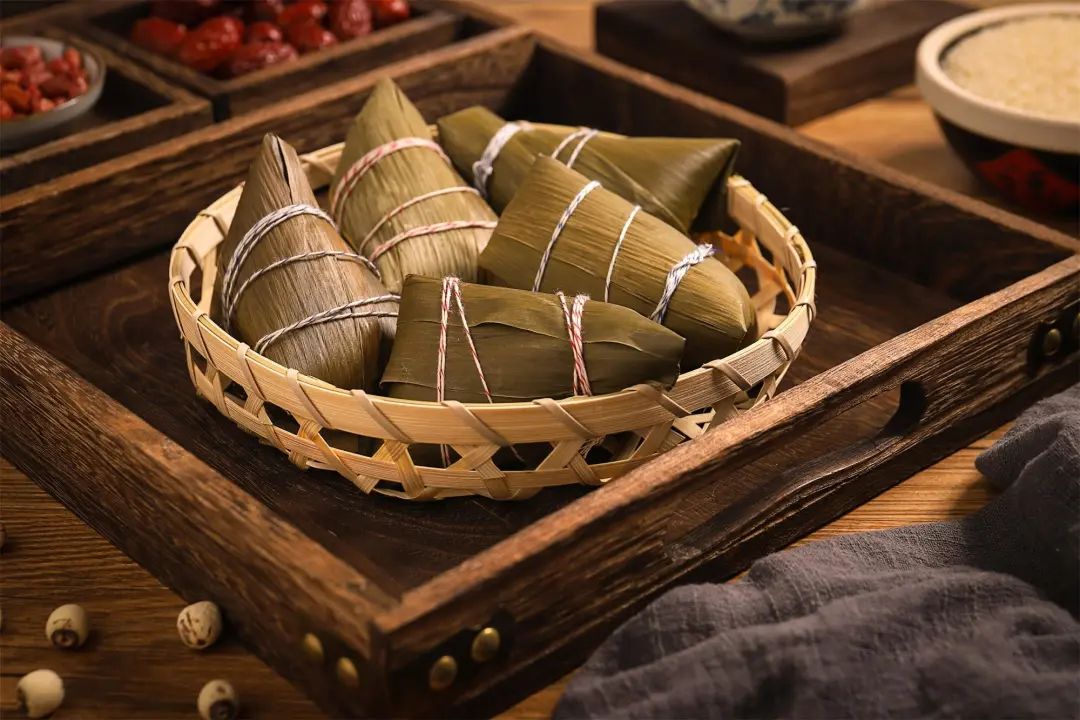Text/Zhu Wenjie
The Dragon Boat Festival, whose real name is Duanwu Festival, is recorded in The Chronicle of Jingchu’s Years. Because it is climbing in midsummer and the sun is on the horizon, it is midsummer in May, and its first afternoon is the day when the weather is good, so the fifth day of May is also called Duanyang Festival. There are also different names such as Chongwu, Chongwu, Noon Festival, Mayday Festival and Dragon Boat Festival. It’s a national holiday, on the fifth day of the fifth lunar month. When I was a teenager, I remember that the old man called the Dragon Boat Festival Duanyang Festival.
There is a saying that the Dragon Boat Festival originated from the summer solstice. The summer solstice is one of the "twenty-four solar terms", which was included in taichu calendar, and the taichu calendar of Han Dynasty was revised and promulgated in Chang ‘an, Han Dynasty. Then, the Dragon Boat Festival originated from the summer solstice, and it was related to Chang ‘an City in Han Dynasty. Taichu calendar is a new calendar made by Sima Qian, Tang Dou and Luo Xiahong in Chang ‘an, the capital of Han Dynasty, and it is the first scientific calendar in the history of China. As one of the 24 solar terms, the summer solstice has an orthodox and legal status when it is implemented throughout the country. Therefore, the Dragon Boat Festival should be the earliest stereotyped in Chang ‘an City in the Western Han Dynasty.

It is an ancient custom of the Chinese nation to wear sachets on the Dragon Boat Festival. Sachet is short for sachet. The sachet is also called sachet, purse, sachet and sachet. In the north of China, especially in the Yellow River valley, and Chang ‘an, the "imperial capital of Guanzhong since ancient times", people also pay attention to wearing sachets on the Dragon Boat Festival. Tracing back to the origin of sachets, it is found that as early as the pre-Qin period, women wore ornaments made of five-color threads on their heads, and in the Southern and Northern Dynasties, they developed into sachets, and in the Tang Dynasty, fragrant balls filled with spices appeared. The main raw materials of the sachet are realgar, mugwort leaves, smoked grass, etc. The sachet is wrapped with silk cloth, which is full of fragrance, and then tied with five-color silk strings to form a string in various shapes, all kinds of which are exquisite and lovely.

Children wear sachets around their necks and five-color flower ropes on their arms and ankles, which are called "hundred ropes". Hundreds of ropes should not be broken or discarded at will, and they can only be cut off at the first thunder in summer, which indicates that there is no disease or disaster in a year. Or throw it into the river during a heavy rain or the first bath in summer, which means that the river will wash away the plague and disease. It is said that children wearing colorful flower ropes can avoid the harm of snakes and scorpions. Is this related to the fact that Chang ‘an people in the Tang Dynasty wore five-color ribbons on this day, which were called "long life wisps", "five-color wisps" and "continuous life wisps"? In Han Ying Shao’s "Customs Tongyi", there is a saying: "On May 5, five-color silk was used to tie the arms, and the name was Long Life Silk, one continued life silk, one ordered soldiers to fight, one ordered five-color silk, and one ordered Zhu Suo to fight soldiers and ghosts, so that people would not get sick." Why use five colors? It may be because the ancients worshipped five colors, which are related to gold, wood, water, fire and earth in the five elements of yin and yang, and are auspicious colors.
In the loess plateau of northern Shaanxi, there is still a custom in the countryside: mothers should make purses (sachets) for children before the age of 12 on their birthdays or during the Dragon Boat Festival. One of the most important is to wear a "body double Eva" purse. Body double doll’s modeling is based on "catching bun doll", which is free to play and has a variety of changes, without certain rules. I don’t know this "body double Baby" purse, but it seems that it has something to do with the popular "life-renewing thread" in Chang ‘an in Tang Dynasty.
The sachet has been widely circulated among the people in China for thousands of years. The sachet contains realgar, which reminds me of the Dragon Boat Festival when I was a child. Adults should drink realgar wine and paint children with realgar on their foreheads, palms and soles. Chinese medicine books say that realgar can cure all kinds of insect poisons, pests and animal injuries, so there are folk proverbs such as "drinking realgar wine will drive all diseases away" and "drinking realgar and calamus wine on May 5 will eliminate all diseases and ban all pests".
Then, on the Dragon Boat Festival, you should put Ai and Zhong Kui on the door. Chang’ an folk proverb has the stress of "inserting willows in Qingming Festival and hanging Ai in Dragon Boat Festival". Hanging mugwort leaves can ward off evil spirits, and burning mugwort sticks can also smoke mosquitoes.
Stick a portrait of Zhong Kui, because Zhong Kui is a keeper. But why do you want to post it on the Dragon Boat Festival? It is said that the Dragon Boat Festival on May 5th is Zhong Kui’s birthday. In the Tianbao period, it is said that Li Longji, Emperor of the Tang Dynasty, suffered from spleen disease occasionally after giving a lecture in Lishan Mountain, Lintong, and he could not be cured for a long time. On the evening of May 5, he dreamed that two ghosts, one big and one small, were wearing red crotch pants, stealing Yang Guifei’s sachet and Yu Di of the Ming Dynasty, and ran around the temple. GREAT GHOST wears a blue robe and hat, catches the kid, gouges out his eyes and swallows it in one gulp. And claimed that he was "palace examination missed the Jinshi Zhong Kui", and the emperor woke up and recovered immediately. Therefore, Wu Daozi was ordered to make a picture of Zhong Kui catching ghosts in his dream and hang it in the palace to ward off evil spirits.
Zhong Kui, a native of Zhongnanshan, is recorded in various ancient books. "History of Tang Yi" has: "I went to Nanshan to be a scholar of Zhong Kui." In the Song Dynasty’s Ji Yuan of Things, "Zhong Kui is a scholar in Zhongnanshan." Jin Nong, a painter in the Qing Dynasty, inscribed in his painting Drunk Zhong Kui: "He is not particularly resistant to evil spirits, but he is full of drunkenness. He wants to see the prosperity of the southern scholars and is glad that it is peaceful."
The Complete Poem of Tang Dynasty contains the poem "Xie Ci Zhong Kui and Calendar Table" written by Zhang, the prime minister of the Tang Dynasty, including thanking the emperor for giving himself a portrait of Zhong Kui. It seems that sticking Zhong Kui as a town house to ward off evil spirits really started from Chang ‘an in the Tang Dynasty, especially from the palace and the upper class.
The custom of Dragon Boat Festival is also related to Zhong Kui. The first is "please Zhong Kui". On the Dragon Boat Festival, people invite Zhong Kui into their homes, or tie Yu Pei with a statue of Zhong Kui on his chest. The second is "jumping Zhong Kui" and "disturbing Zhong Kui". It has been an important part of the Dragon Boat Festival and the Spring Festival since the Jin Dynasty. Experts from Zhong Kui Institute of Culture and Art in Xi ‘an have verified that the Dragon Boat Festival is a very important folk cultural activity since ancient times. People call it "Zhong Kui Cultural Dragon Boat Festival".
The legend of the "Pomegranate Flower God" in May is Zhong Kui: "The May Flower God is ugly in Zhong Kui, and the Tang King won’t be the champion. Folium Artemisiae Argyi, like a flag, takes all kinds of clothes, and the pale cattail, like a sword, kills demons. Realgar wine, drink a few cups, and a breeze blows on your face. " On May 5th, the Dragon Boat Festival is considered an evil day by the people, and it is also the season when poisonous insects breed and diseases are prevalent. Zhong Kui is regarded by the people as "the sage of blessing the town house", which contributes to exorcising ghosts and evil spirits, avoiding evil spirits and eliminating plague. There is a folk custom of sticking a statue of Zhong Kui on the Dragon Boat Festival to "kill evil". In the door painting, Zhong Kui Qiu must be glaring, waving a sword, and his veins stood out. Although Zhong Kui looks ferocious and ugly, Shaanxi folks think that "ghosts and gods are afraid of the wicked"! The "evil" in the Qin population is fierce. Zhong Kui people are ugly, but they are very real, and their sex is like fire. It seems that pomegranate flowers are in full bloom during the Dragon Boat Festival. In addition, pomegranate flowers were used as the mascot of the Dragon Boat Festival as early as the Tang Dynasty. "A Brief Introduction to the Scenery of Emperor Jing" said: "From May 1 to 5, every family decorated their little girls with pomegranate flowers" to ward off evil spirits. Therefore, people combine the two and revere Zhong Kui as the May Pomegranate God. At this time, Zhong Kui’s "ugliness" has a soft and flowery implication, and Shaanxi people have nicknamed their children "ugliness".

On the day of the Dragon Boat Festival, the most common food is "Zongzi". "Local customs" contains: in addition to sticky rice, ancient palm seeds also need ingredients such as millet and jujube. In the Tang Dynasty, Chang ‘an people ate a kind of "Baisuo Zongzi" in a unified way, and many rice dumplings were often made in the palace on this day, so that people could shoot them with small-angle bows before they could eat them. Bring a little competitive entertainment to celebrate the "Duanyang Festival".
Food is the most important thing for the people. In history, there are many days when Chinese people are hungry. It seems that all festivals have become food festivals. Jiaozi in the Spring Festival, glutinous rice balls, moon cakes in the Mid-Autumn Festival and chrysanthemum cakes in Chongyang, and eating zongzi and mung bean cakes in the Dragon Boat Festival have become my best childhood memories.
Why do you want to eat mung bean cake? It should be that mung beans have the medicinal effect of clearing away heat and detoxifying, and you should drink mung bean soup when you are on fire. Therefore, in addition to satisfying people’s taste, eating mung bean cake during the Dragon Boat Festival is also about diet therapy, detoxification and fire elimination, and good health.
Many contents in the custom of Dragon Boat Festival, such as "fighting a hundred herbs", "stepping on a hundred herbs" and "collecting miscellaneous medicines", have nothing to do with commemorating Qu Yuan. I live in Chang ‘an, and whenever I celebrate the Dragon Boat Festival, I feel that the custom of the Dragon Boat Festival here seems to have little to do with Qu Yuan. This is all because of the different customs between the north and the south, but the Dragon Boat Festival should be multi-source.
In the custom of Dragon Boat Festival, "Dragon Boat Race" and "Eating Zongzi" are both in memory of Qu Yuan. In 278 BC, Qin Jun conquered the capital of Chu. When Qu Yuan saw the demise of his country, Chu, his heart ached. After writing his masterpiece Huai Sha, Qu Yuan threw a stone into the river. People are afraid that fish and shrimp in the river will eat their bodies, so they throw zongzi to feed them.
Wen Xiu, a monk in the Tang Dynasty, said, "The festival is divided into the Dragon Boat Festival, and it is rumored to be Qu Yuan throughout the ages." Therefore, the Dragon Boat Festival is also called Poet’s Day. The Dragon Boat Festival was designated as Poet’s Day, which was in the Anti-Japanese War more than 70 years ago. At that time, a grand poet’s day celebration was held every year. On the Dragon Boat Festival on June 10th, 1940, the All-China Anti-Enemy Association of Literary and Art Circles held a poetry recitation in Chongqing to commemorate Qu Yuan. At the meeting, it was suggested that the annual Dragon Boat Festival be the poet’s day in China-this is the origin of the poet’s day. Setting up a festival in memory of a poet shows that our Chinese nation is a great nation that attaches great importance to poetry and advocates culture.
Brief introduction of the author
Zhu Wenjie, born in Xi ‘an in 1948, is a librarian of Xi ‘an Literature and History Museum, director of "Old Xi ‘an Research Center", honorary president of Xi ‘an Poetry and Calligraphy Research Institute, deputy director of China Festival Culture Research Center of Northwest University, and vice president of Xi ‘an Qinzhuan Hanwa Research Institute. He is a member of Chinese Writers Association and a national first-class writer.
(The picture of the article comes from the Internet. If there is any infringement, please contact Xiaobian to delete it.)
Original title: Reading | Dragon Boat Festival and Chang ‘an
Read the original text